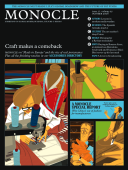
Issue 17
Craft makes a comeback: Monocle on “Made in Europe” and the rise of real provenance. Plus, all the finishing touches in our Accessories Directory.
In This Issue
Oops! No content was found.
Looks like we no longer have content for the page you're on. Perhaps try a search?
Return Home

